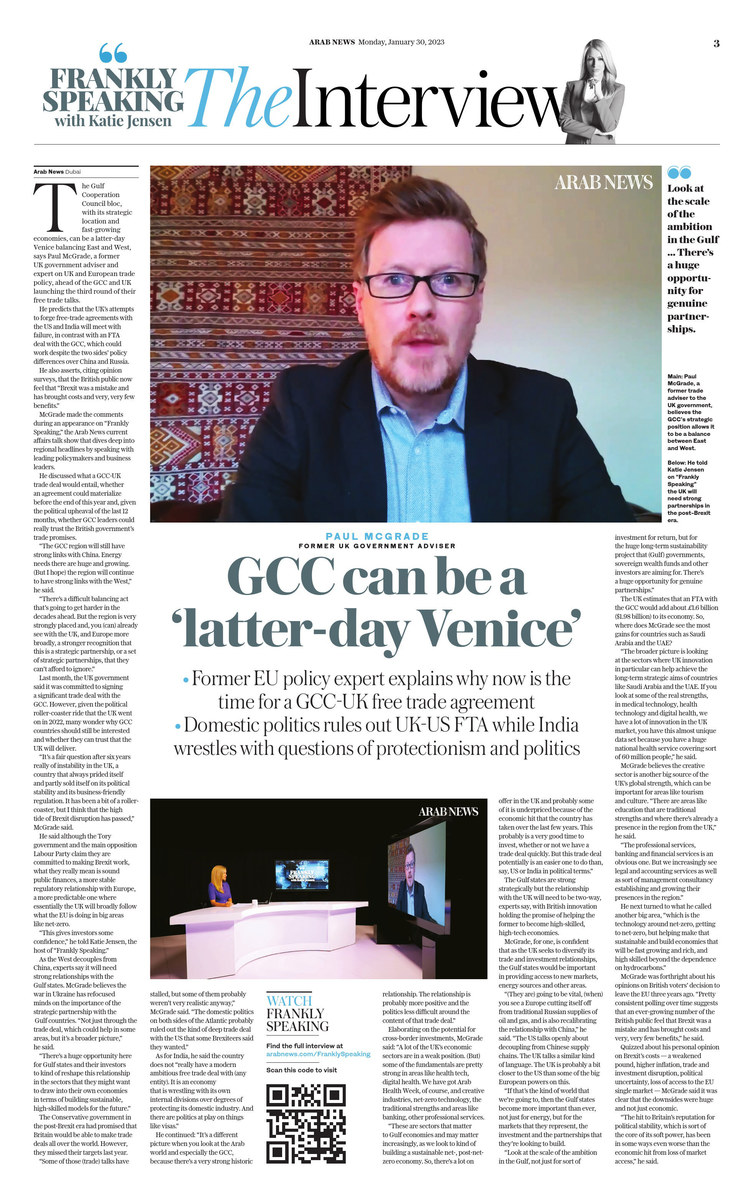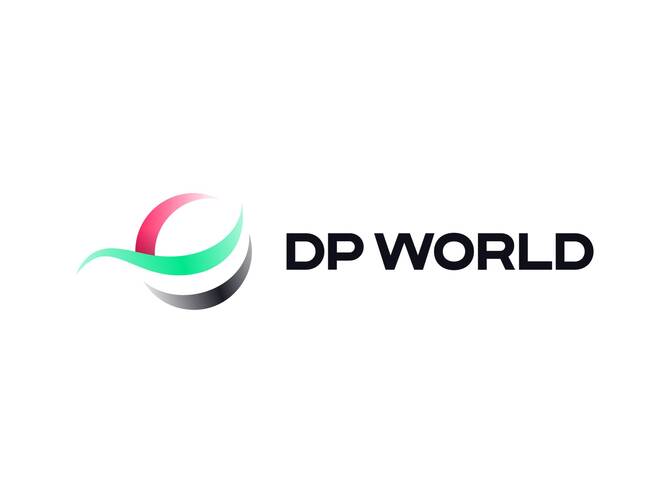DUBAI: The GCC bloc, with its strategic location and fast-growing economies, can be a latter-day Venice, balancing between East and West, according to Paul McGrade, a former UK government adviser and an expert on UK and European trade policy, who was speaking as the GCC and the UK prepare to launch the third round of their free trade talks.
He predicts that the UK’s attempts to forge free-trade agreements with the US and India will meet with failure, in contrast with an FTA deal with the GCC, which could work despite the two sides’ policy differences over China and Russia.
He also asserts, citing opinion surveys, that the British public now feel that “Brexit was a mistake and has brought costs and very, very few benefits.”
McGrade made the comments during an appearance on “Frankly Speaking,” the Arab News current affairs talk show that dives deep into regional headlines by speaking with leading policymakers and business leaders.
He discussed what a GCC-UK trade deal would entail, whether an agreement could materialize before the end of this year and, given the political upheaval of the last 12 months, whether GCC leaders could really trust the British government’s trade promises.
“The GCC region will still have strong links with China. Energy needs there are huge and growing. (But I hope) the region will continue to have strong links with the West,” he said.
“There’s a difficult balancing act that’s going to get harder in the decades ahead. But the region is very strongly placed and, you (can) already see with the UK, and Europe more broadly, a stronger recognition that this is a strategic partnership, or a set of strategic partnerships, that they can’t afford to ignore.”
Last month, the UK government said it was committed to signing a significant trade deal with the GCC. However, given the political roller-coaster ride that the UK went on in 2022 and the fact that it is no longer the manufacturing giant of the last century, many wonder why GCC countries should still be interested and whether they can trust that the UK will deliver.
“It’s a fair question after six years really of instability in the UK, a country that always prided itself and partly sold itself on its political stability and its business-friendly regulation. It has been a bit of a roller-coaster, but I think that the high tide of Brexit disruption has passed,” McGrade said.
He said although the Tory government and the main opposition Labour Party claim they are committed to making Brexit work, what they really mean is sound public finances, a more stable regulatory relationship with Europe, a more predictable one where essentially the UK will broadly follow what the EU is doing in big areas like net-zero.
“This gives investors some confidence,” he told Katie Jensen, the host of “Frankly Speaking.”
“The UK is not going to be towing itself off into mid-Atlantic or the Pacific Ocean. It’s going to be geographically, obviously and in regulatory terms, very firmly anchored in the European neighborhood. That gives a bit of confidence and a bit of stability going forward. And the UK needs investment, which has dropped off sharply since the 2016 vote.”
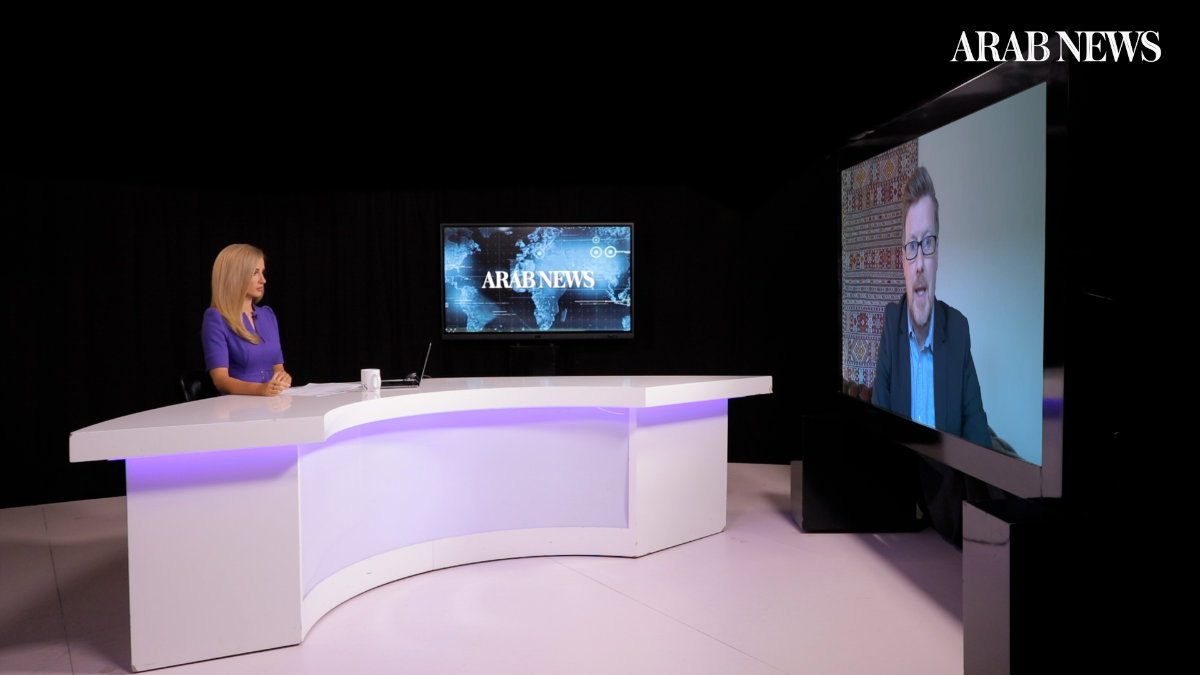
Paul McGrade, a former UK government adviser and an expert on UK and European trade policy, on Frankly Speaking, hosted by Katie Jensen. (AN photo)
As the West decouples from China, experts say it will need strong relationships with the Gulf states. McGrade believes the war in Ukraine has refocused minds on the importance of the strategic partnership with the Gulf countries. “Not just through the trade deal, which could help in some areas, but it’s a broader picture,” he said.
“There’s a huge opportunity here for Gulf states and their investors to kind of reshape this relationship in the sectors that they might want to draw into their own economies in terms of building sustainable, high-skilled models for the future.”
The Conservative government in the post-Brexit era had promised that Britain would be able to make trade deals all over the world. However, they missed their targets last year. The UK has only signed trade agreements with about 60 percent of their global trade partners and talks with the US and India have stalled.
“Some of those (trade) talks have stalled, but some of them probably weren’t very realistic anyway,” McGrade said. “The domestic politics on both sides of the Atlantic probably ruled out the kind of deep trade deal with the US that some Brexiteers said they wanted.”
As for India, he said the country does not “really have a modern ambitious free trade deal with (any entity). It is an economy that is wrestling with its own internal divisions over degrees of protecting its domestic industry. And there are politics at play on things like visas.”
He continued: “It’s a different picture when you look at the Arab world and especially the GCC, because there’s a very strong historic relationship. There are obviously difficult issues in any trade deal about market access, but the relationship is probably more positive and the politics less difficult around the content of that trade deal.”
Elaborating on the potential for cross-border investments, McGrade said: “A lot of the UK’s economic sectors are in a weak position. (But) some of the fundamentals are pretty strong in areas like health tech, digital health. We have got Arab Health Week, of course, and creative industries, net-zero technology, the traditional strengths and areas like banking, other professional services.
“These are sectors that matter to Gulf economies and may matter increasingly, as we look to kind of building a sustainable net-, post-net-zero economy. So, there’s a lot on offer in the UK and probably some of it is underpriced because of the economic hit that the country has taken over the last few years. This probably is a very good time to invest, whether or not we have a trade deal quickly. But this trade deal potentially is an easier one to do than, say, US or India in political terms.”
The Gulf states are strong strategically but the relationship with the UK will need to be two-way, experts say, with British innovation holding the promise of helping the former to become high-skilled, high-tech economies.
McGrade, for one, is confident that as the UK seeks to diversify its trade and investment relationships, the Gulf states would be important in providing access to new markets, energy sources and other areas.
“(They are) going to be vital, (when) you see a Europe cutting itself off from traditional Russian supplies of oil and gas, and is also recalibrating the relationship with China,” he said. “The US talks openly about decoupling from Chinese supply chains. The UK talks a similar kind of language. The UK is probably a bit closer to the US than some of the big European powers on this.
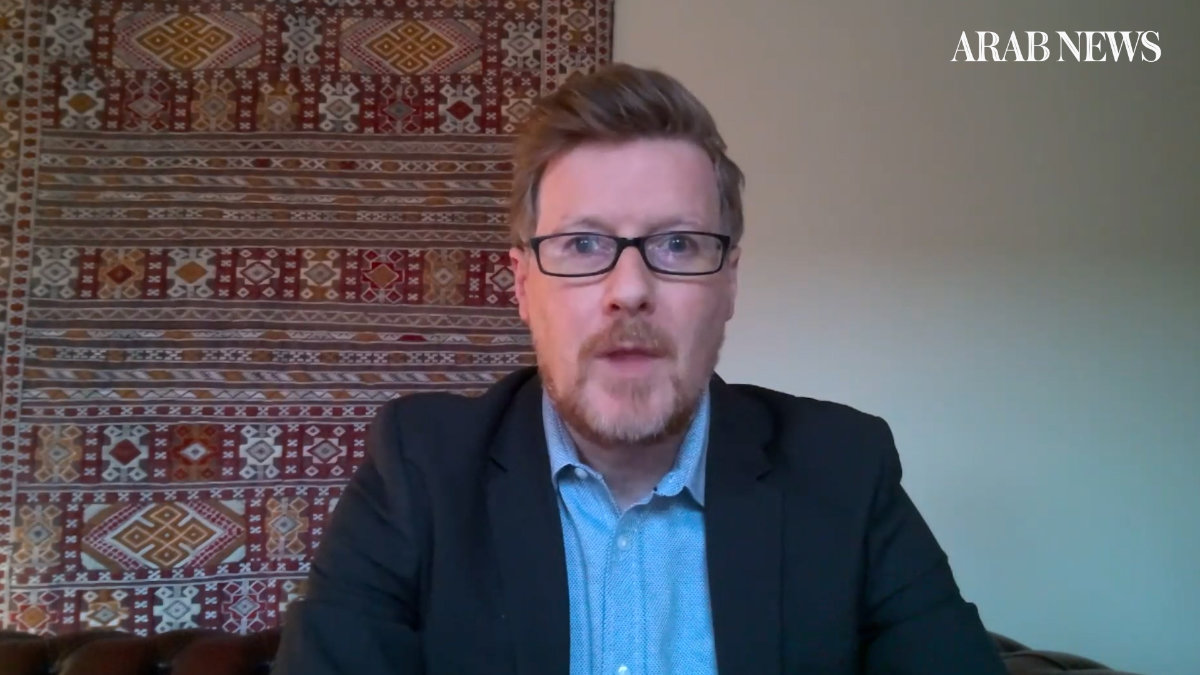
Paul McGrade, a former UK government adviser and an expert on UK and European trade policy, on Frankly Speaking, hosted by Katie Jensen.
“If that’s the kind of world that we’re going to, then the Gulf states become more important than ever, not just for energy, but for the markets that they represent, the investment and the partnerships that they’re looking to build.”
“Look at the scale of the ambition in the Gulf, not just for sort of investment for return, but for the huge long-term sustainability project that (Gulf) governments, sovereign wealth funds and other investors are aiming for. There’s a huge opportunity for genuine partnerships where some of those innovative technologies that the UK still excels at could be a part of building up that sustainable skills base in Gulf economies.”
The UK estimates that an FTA with the GCC would add about £1.6 billion ($1.98 billion) to its economy. So, where does McGrade see the most gains for countries such as Saudi Arabia and the UAE?
“A trade deal is nice to have, but it’s not essential. These are already quite open economies in global terms. They already have strong trading relationships with the UK. A trade deal could help reduce some of the barriers, but it’s not the biggest game in town,” he said.
“The broader picture is looking at the sectors where UK innovation in particular can help achieve the long-term strategic aims of countries like Saudi Arabia and the UAE. If you look at some of the real strengths, in medical technology, health technology, digital health, we have a lot of innovation in the UK market, which is often underpinned by the fact that you have this almost unique data set because you have a huge national health service covering sort of 60 million people.”
McGrade believes the creative sector is another big source of the UK’s global strength, which can be important for areas like tourism and culture, in which some Gulf states have made a big investment. “There are areas like education that are traditional strengths and where there’s already a presence in the region from the UK,” he said.
“The professional services, banking and financial services is an obvious one. But we increasingly see legal and accounting services as well as sort of management consultancy establishing and growing their presences in the region.”
He next turned to what he called another big area, “which is the technology around net-zero, getting to net-zero, but helping make that sustainable and build economies that will be fast growing and rich, and high skilled beyond the dependence on hydrocarbons.”
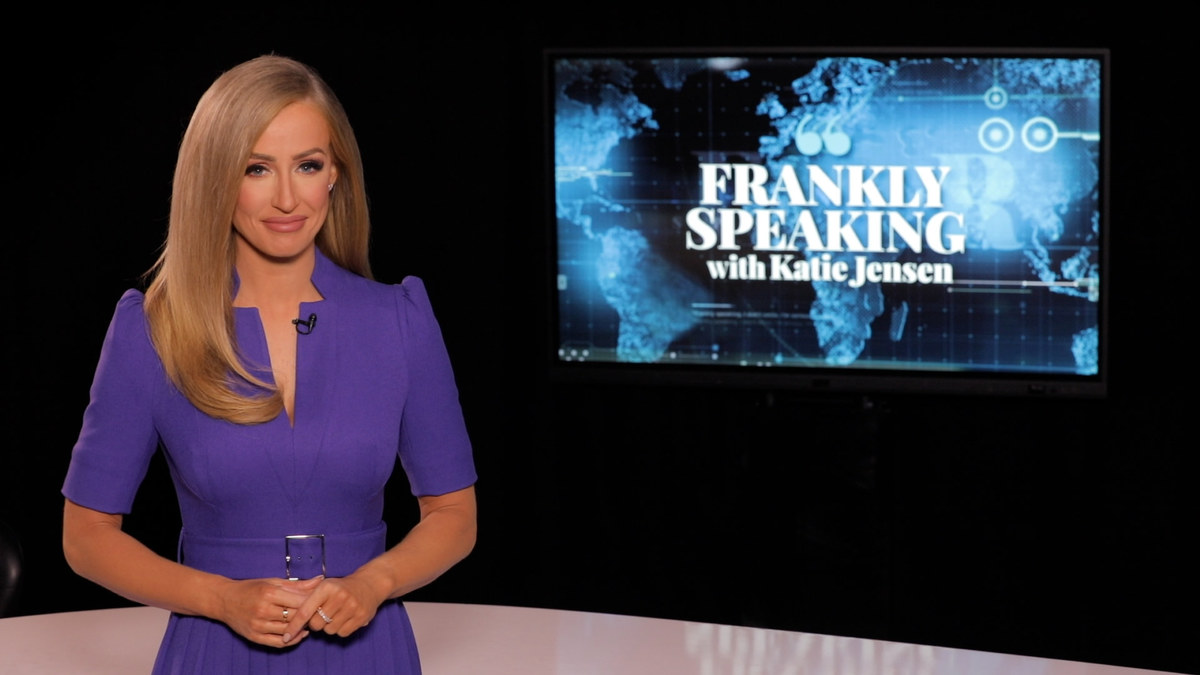
Katie Jensen. (AN photo)
“There’s a lot there. Sovereign wealth funds in the region are already investing in some of these sectors. In some cases, what they’re looking for in a partnership is to bring some of those skills back home to the region so that they can be used to help build up the domestic high skills and high tech that will be needed (in the) longer term into the century to keep high-growing rich economies in the Gulf region.”
But what happens if the UK fails to sign a specific deal with the GCC as a whole? Does it then have the option to look at single individual trade deals with, say, the UAE, Saudi Arabia and Qatar?
McGrade says this has been happening in fact. “It’s been signing individual agreements across some sectors with some of the GCC members. That would continue,” he said.
“Whatever the governments do, those economic fundamentals ought to be attractive to Gulf investors, whether that’s at the state, kind of sovereign wealth fund level or kind of business level, because some of those strengths of the UK economy, innovation across several sectors, can really be part of the answer to what Gulf economies need to do and know they need to do to build sustainable, high-skilled, post-net-zero economies for the 21st century.”
As for the GCC countries’ less hawkish approach to Russia, McGrade does not see that as a hindrance to talks with the UK. “For two reasons,” he said. “There is a greater recognition of the strategic importance of the Gulf region, for the UK and for the West generally because of the war in Russia. Because of what that means for energy prices and long-term energy needs.
“The other point is that if the West is going to decouple from China, then it needs the Gulf. The Gulf states are well placed. They are in a strong position economically.”
To be sure, McGrade said, “the UK and Western governments generally always wrestle with some public opinion and campaigning groups at home on some of the values agenda. They always worry about if that can be squared off with the needs of the strategic relationship with the Gulf. That will continue to be an issue.”
Alluding to technical and political barriers to reaching a trade deal, he acknowledged that the two sides have different opinions on certain issues but said: “They are not showstoppers. The deal is doable. It’s probably more about political will in London. It would be a failure of political will if that deal isn’t done.”
McGrade was forthright about his opinions on British voters’ decision to leave the EU three years ago. “Pretty consistent polling over time suggests that an ever-growing number of the British public feel that Brexit was a mistake and has brought costs and very, very few benefits,” he said.
Nevertheless, he said, both the Conservative and Labour parties have concluded that they cannot revisit the trade deal in a fundamental way. “There is a review of the trade deal at the five-year point, which comes in 2025,” he said. “If Labour wins the election, they will want to improve the terms of the trade deal without changing its fundamental character.”
Quizzed about his personal opinion on Brexit’s costs — a weakened pound, higher inflation, trade and investment disruption, political uncertainty, loss of access to the EU single market — McGrade said it was clear that the downsides were huge and not just economic.
“The hit to Britain’s reputation for political stability, which is sort of the core of its soft power, has been in some ways even worse than the economic hit from loss of market access,” he said.
